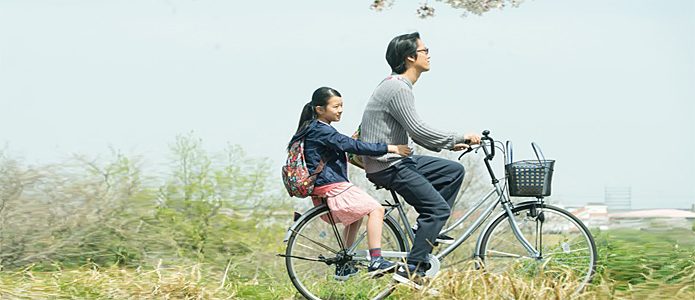What is being loved? And where is the line between that and sex? These are the questions been asked of the three characters in “Close Knit”, Naoko Ogigami’s fourth appearance at the Berlin Film Festival.
The gentle love story of Close Knit starts with the quiet sound of a piano and a closeup of some panties. A bra used as a symbol. And in a messy room, a young school girl called Tomi (Rinka Kakihara) silently devours a convenience store rice ball. When the end credits rolled and Naoko Ogigami’s name came up, I clapped. I looked around at the other audience members, met their smiles and nodded.
One day, her mother quits work and disappears with a man. Tomo goes to live with her uncle, Makio (Kenta Kiritani). It is not the first time her mother has disappeared and she has gone to live with her uncle, but there is something different about it this time – Makio is now living with his girlfriend, Rinko (Toma Ikuta). Makio admits that there is something unusual about Rinko in that she used to be a man. The everyday lives of Tomo, Makio and Rinko as they live together are gently depicted in the course of the film.
I was very surprised at the abilities of Rinko. She has a relaxed way of speaking, she makes delicious food, she knits with dexterity, creating large numbers of bag-shaped somethings. Apparently, she has a 200cc E cup. In the park when Tomo opens the lunchbox that Rinko has made her, she's faced with a super cute design which made all the audience laugh. During the screening, the audience seemed to most enjoy the meal scenes and the knitting scenes, laughing many times (I loved the scene where the 108 somethings are burned!).
Japanese LGBT Community
The population of LGBT identifying people in Japan is 1 in 13. It is roughly the same as left-handed people. It is increasingly being picked up by the media, in particular with the cultural phenomenon of “One Talent”, allowing them to slowly gain acceptance in wider Japanese society. However, sometimes I get the feeling that they take an arrogant stance where they are different, difficult to understand or special, demanding one-sided empathy.
The young boy Kai’s mother Naomi (Eiko Koike) says to Tomo that she doesn't think they should be considered the same type of people. They're not normal. But she’s not being malicious. She just doesn’t know. And Kai is sad for the 6 year old Ono, and suffers from his intolerant mother’s lack of understanding. What does it mean to be a man or to be a woman? How should we in our current society handle the identity of people who do not fit into what they were considered originally?
The scene where Rinko as a suffering junior high school student mutters “I want boobs” is significant. Rinko’s mother Funkio (Misako Takana) simply accepts it. Understanding and accepting is simple yet difficult. While I was watching the movie, my heart was touched. Makio recalls when he fell for Rinko. He didn’t care whether Rinko was a boy or a girl, he loved her.
Director Naoko Ogigami's
Close Knit is being screened in Panorama and Generation. This is Naoko Ogigami’s fourth appearance at the Berlin Film Festival.
It will go on public release in Japan on the 25th February.
